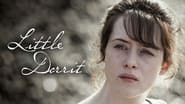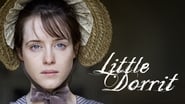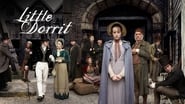sbrumfit
I watched the Christine Edzard film of Little Dorrit aged fourteen and was so enthused by it that I ended up doing work experience on her next film. For this reason I resisted watching this version for a long time. I relented recently having just read the book, but I was right to be wary. Watching this version reminded me how good the 1988 Edzard films were. This version has good production values and some very strong performances (although I still find Matthew McFadyen annoyingly wooden), but it lacks much of the book's depth and subtlety, while ironing many of his characters (who are always larger than life) into shadows of their written selves. The story has been 'distilled' and the stakes raised so that it has become a quest story, rather than a social satire with a quest element. Everyone seems about ten years too young for the parts they play, except Clare Foy, who is altogether too tall, too old and too knowing for Little Dorrit. They are also far too clean, as is London, and William Dorrit's room in the Marshalsea is so enormous it might qualify for the status of 'suite' when in fact the rooms in the Marshalsea were shared and less than ten feet square. Plus the language is far too modern and some of the details anachronistic (Clennam would NEVER have kissed his mother hello in 1826, even if she hadn't been a fearful old battle-axe). Most annoying of all, this version explains and signposts through scenes that have no place in the book, while cutting others (like the wonderful introduction of Flora Finching) back to the bone.The Edzard version takes a more consistent approach to the point of view issue by telling the story twice, once from Clennam's point of view and then again from Little Dorrit's (and in a sense this version, with its shifting perspectives, is truer to the book). The camera-work is far more engaging in this version; Edzard's camera is static, a cool observer, whereas this version employs a liquid, flowing approach that gives the geography of the city greater life and a more sinister edge. Nonetheless the film is far better cast and its use of the original dialogue is more authentic.The summary of Episode One in the DVD set describes Amy as an 'enterprising young woman'. This misses the point. She is a girl under pressure, a child, like so many in the developing world today, whose responsibilities are far greater than they should have to bear. It's Dickens's exploration of exploitation and imprisonment, in all its forms, that forms the essence of Little Dorrit. And I'm not sure this version does justice to any of these themes.
Allen Branson
Generally the BBC adaptation of Dickens are great, but this was just something more. Not only is this a great story, parts of which could have been ripped from recent financial headlines, but the script, cast and direction were pretty much flawless from beginning to end. And did I mention the cinematography? The plan was to watch the 4 disc set over several days. That didn't quite work out. The second day became a marathon viewing session. All of us watching kept calling out for the next installment as soon as the previous one came to an end. It had it all: love story, social commentary, great characters, and a mystery that isn't solved until the very end. I won't say what that is. In a way, it is incidental to the story. It will keep you guessing, but it is not really the point.Get it and watch it. You won't be disappointed.
kabosse
This BBC adaptation of the Dickens novel has enthralled me from the very beginning, mainly because of the outstanding quality of its performances. Every single character, even minor ones like the insufferably haughty Merdle butler or the paranoid Italian (perhaps with the exception of Maggy who's perfectly manicured fingernails in one close-up blew her otherwise worthy portrayal), has been ideally cast and all the actors are absolutely convincing in their delivery.What made me write this comment, though, was Tom Courtenay's heart-wrenching performance as Mr. Dorrit for which I hope he will receive all the accolades he deserves. His multifaceted Dorrit awed me until the very end and will resonate with me for a long time.What I particularly liked about the series was how we got more than a glimpse of all the characters' 'little lives', people going about their respective businesses, revolving in their little worlds. Even if a scene only touched on a certain character, setting, costumes, and dialogue provided ample information for the viewer to evoke the full picture of this character's life and to imagine how they would go on after the camera had panned away to continue with the main story.On top of that, the great care put into the selection of costumes and locations made Little Dorrit a real feast for the eye, perfectly accompanied by the wonderful score by John Lunn.May this be a 'true Dickens' or not, what it surely is, is Grand TV. And as such, it adds another sparkling jewel to my cherished collection of BBC adaptations.
LouE15
Oh, I do love a good period drama… I got interested enough after one episode of this to re-read the book for the first time in 10 years, and was impressed by how very dark and cynical Dickens' tone is. The show is well-shot and well made, and does the book justice in almost every way. The only thing which is – so far – slightly lost is the cynicism: the staggering incompetence and idleness of the Circumlocution Office is meant to be an attack on the whole governmental administration system. Likewise, the inordinate raising up of one person above others on a great balloon of hot air, and the great, national disgrace that was the imprisonment of whole families for debt. The intensity of the satire is missing – which is a great shame, since a central part of the story finds its perfect parallel in events unfolding both in this country and elsewhere right now. That was a missed opportunity – but I suspect the show wouldn't have attracted such ready funding and promotion if it laid the satire on too thick at the expense of say, the costumes (yawn).The casting is excellent, and it seems almost unfair to single out individuals from the list, including Judy Parfitt's cold Mrs Clennam, Tom Courtenay's vain, haunted Mr Dorrit, Russell Tovey's charmingly emotional young Chivery, Claire Foy's delicate, youthful Amy and Matthew McFadyen's kind-hearted, generous Arthur. Ruth Jones' wondrous recreation of the voluminous Flora is bettered only by Annette Crosbie's frankly terrifying Aunt. (She's how I want to be when I get old!) I'd been disappointed by McFadyen's Mr Darcy in the Joe Wright film "Pride & Prejudice" - it was almost at times as if he had been stuffed, and his looks were somehow lost in the mix. Here all his best attributes are to the fore – his eyes, his height, his voice and manner, the excellence of his diction – all these create a warm, breathing man out of really quite flimsy material. In the book and even in this dramatisation, Arthur is a rather shadowy presence, on the sidelines while things happen to those around him. Yet his appearance each week is like a beacon, a feeling of warmth, like home. Claire Foy does a really wonderful job as the title character. Dickens' heroines used to drive me mad – so tiny and blushing and always so very, irritatingly good, drat them. Foy manages to be all of these things, but to be likable too, and I very much admire her for it. The way she looks at her father – half with love, half with pity – is spot on. Tom Courtenay is brilliant – I can't imagine anyone else being able to bring so much to the character of this foolish, vain, blind Mr Dorritt. I kept missing episodes and having to watch them on the (BBC's excellent i-player) catch up site. Now I've at last seen the final episode I think it's sadly rushed, missing a few voyeuristic opportunities for catching up on some of the minor characters seen in the series. However the scenes between John Chivery, Arthur and Amy are moving and beautifully handled. I will definitely be getting hold of the DVD. This one's a keeper.





